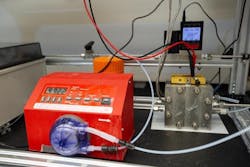University of Cincinnati Researchers ID Path to More Efficient Ethylene Production
Engineers at the University of Cincinnati say they have created a more efficient way of converting carbon dioxide into ethylene, according to a news release.
The researchers used a modified copper catalyst to improve the electrochemical conversion of carbon dioxide into ethylene.
The process holds promise for one day producing ethylene through green energy instead of fossil fuels, according to Jingjie Wu, an associate professor in the chemical engineering lab in UC’s College of Engineering and Applied Science.
“Ethylene is a pivotal platform chemical globally, but the conventional steam-cracking process for its production emits substantial carbon dioxide,” Wu said. “By utilizing carbon dioxide as a feedstock rather than depending on fossil fuels, we can effectively recycle carbon dioxide.”
The electrocatalytic conversion of carbon dioxide produces two primary carbon products, ethylene and ethanol. Researchers found that using a modified copper catalyst produced more ethylene.
“Our research offers essential insights into the divergence between ethylene and ethanol during electrochemical CO2 reduction and proposes a viable approach to directing selectivity toward ethylene,” said UC graduate Zhengyuan Li, lead author of the study.
This leads to 50% more ethylene selectivity, Wu said.
“Ideally, the goal is to produce a single product rather than multiple ones,” Wu said.
The next step is refining the process to make it more commercially viable, Li said. The conversion system loses efficiency as byproducts of the reaction such as potassium hydroxide begin forming on the copper catalyst.
“The electrode stability must be improved for commercial deployment. Our next focus is to enhance stability and extend its operation from 1,000 to 100,000 hours,” Li said.
